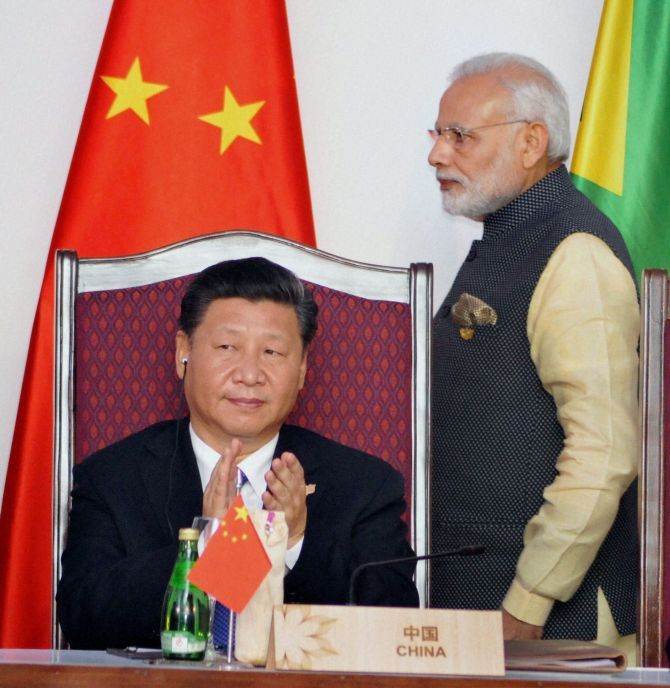But Modi and Xi will attend a BRICS leaders meeting in Hamburg.

China on Thursday said the “atmosphere” was “not right” for a bilateral meeting between Prime Minister Narendra Modi and President Xi Jinping on the sidelines of the G20 Summit in Hamburg, amidst a standoff between the armies of the two countries in the Sikkim section.
The “atmosphere is not right” for a bilateral meeting between President Xi and Prime Minister Modi, Chinese foreign ministry officials said ahead of the G20 Summit in the German city of Hamburg from Friday.
However, Indian sources in New Delhi said a meeting of BRICS leaders will take place on the sidelines of G20 summit, which is expected to have the presence of, among others, Modi and Xi, suggesting that there was no bilateral meeting between the two leaders scheduled in Hamburg.
China and India have been engaged in a standoff in the Dokalam area near the Bhutan tri-junction for the past three weeks after a Chinese army’s construction party attempted to build a road. Doka La is the Indian name for the region which Bhutan recognises as Dokalam, while China claims it as part of its Donglang region.
There were reports that Modi and Xi may meet on the sidelines of the G20 Summit to resolve the standoff.
Chinese foreign ministry spokesman Geng Shuang expressed hope that “India can immediately withdraw the border troops to the Indian side of the boundary to uphold the peace tranquillity of the China and India border areas”.
“I think this is the pre-condition for any meaningful peace talks between the two sides,” he told a media briefing when asked about the meeting between Modi and Xi on the sidelines of the G20 summit.
Geng, however, said the BRICS leaders meeting which will be attended by Modi and Xi will take place on the sidelines of the summit on Friday.
On the possibility of a Xi-Modi meeting, Geng said relevant information will be released in a timely manner.
China’s state-run media on Wednesday had quoted Chinese analysts as saying that Beijing would be forced to use a “military way” to end the standoff in the Sikkim sector if India refuses to listen to the “historical lessons” being offered by it.
Asked about minister of state for defence Subhash Bhamre’s remarks that the standoff can be resolved diplomatically and Chinese soldiers should leave the Bhutanese territory to reduce tension in the area, Geng said, “We noted the statement”.
To avoid the situation from “getting worse” as well as to avoid “more serious consequences” the Indian troops should withdraw, he said.
“We have said many times that the illegal entry of Indian border troops at the defined section and mutually recognised boundary is different in nature from previous frictions at the undefined part of the boundary,” Geng said.
“The action taken by India has changed the status quo. Only when India pulls back its troops, status quo will be restored. China has the will to solve the problem through the
diplomatic means and cherish the peace and tranquillity along the border area. But (there should be) unconditional withdrawal of troops by the Indian side,” he said.
Geng also refuted allegations that the Chinese troops entered Bhutan territory. Bhutan has already lodged protest with China saying that the road being built by Chinese troops was in its territory.
“To say that the Chinese troops entered the boundary of Bhutan, we have said many times Dokalam is always under the effective jurisdiction of China,” Geng said, adding that the area is “undisputable”.
China and Bhutan have held 24 rounds of talks, he noted.
“The two sides have basic consensus on the border areas and the alignment of the boundary. China always strictly follows relevant conventions and China’s activities in relevant areas does not breach the convention or the ground situation,” he said.
“As for India, under pretext of Bhutan, it has illegally entered the territory of China, thus hindering the negotiation process between China and Bhutan. We strongly urge India to pull back to the Indian side of the boundary to avoid the situation from getting worse and have some more serious consequences,” he said.
Geng also questioned India’s apprehension that the strategic road being built by China in Dokalam area in Sikkim sector could hand China the advantage as Beijing may use it can cut-off India’s access to its north-eastern states.
“I don’t understand why building of a road by China can bring serious risk to India. China building road on its own territory is a justified action by a sovereign state.
“Anyone who knows basic rules of international relations knows that so-called security concerns of India is to trespass the defined boundary to enter the territory of neighbouring countries,” he said.
“No matter what kind of activities India is engaged in, this will not be tolerated by any sovereign state. This kind of protests are ridiculous. During the past few decades, it is India that built many facilities and deployed a lot of forces along the line, even crossing the line, constantly changing status quo of border areas,” Geng alleged.
Without referring to the massive infrastructure development undertaken by China in Tibet and at other parts of the Line of Actual Control, he also accused India of building infrastructure along the border without taking into consideration China’s security concerns.
“I don’t know while doing so, whether India has taken into account the security concerns of China,” Geng said of India’s infrastructure development in the border areas.
“The aim of this incident is, under the pretext of so-called security concerns and protecting Bhutan, flagrantly overstepping the already defined Sikkim section by the mutually recognised 1890 convention, to enter undisputable Dokalam region of China, thus making disputes over Dokalam, hindering the negotiation process between China and Bhutan. I believe more and more countries will come around to this,” he said.










